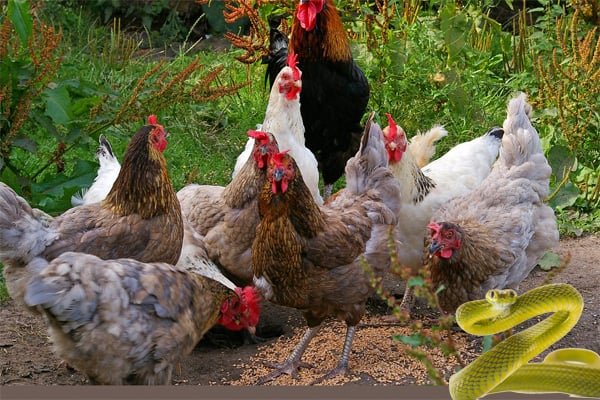Keep snakes out of your chicken coop

Few things are as frightening to chicken keepers as a snake in the chicken coop.
What you need to know:
Whether snakes go into chicken coops for food or refuge, the cold-blooded reptiles can be dangerous to the chicken and humans alike. Experts offer ideas on what farmers can do to keep chicken and workers safe
Few things are as frightening to chicken keepers as a snake in the chicken coop. These slithering pests threaten both baby chicks and adult chickens. Venomous snakes can also threaten the lives of chicken keepers.
Dr Harunah Kaaya, a livestock farmer and consultant with Chick Masters in Mukono, says that the rainy season such as this one forces snakes to seek refuge in houses and coops which could pose a big threat to livestock rearing. He says that snakes normally enter a coop for the eggs, the chicken, or the rodents that reside in chicken coops. Sometimes, the snakes are looking for water especially in dry seasons and water dishes in chicken coops are more accessible. Snakes can also invade a chicken coop to seek protection or shade from the heat. “This could result in dangerous encounters since snakes love to hide in bedding,” Dr Kaaya says.
He explains that if a farmer notices sudden dwindling of egg production for no apparent reason, it could be a hungry snake snacking on the eggs or stressing out the birds.
Whereas snakes can eat full-grown adult chicken, Dr Kaaya says that most of the time, they are there for the eggs or chicks since they are easier to digest. “Snakes do not eat every day, so it may be 4 to 40 days—sometimes even longer—before it returns for a refill. But a bite from a venomous one could be fatal in case it is attempting to escape,” he says.
Repellent plants
Veterinary doctor Yahaya Were explains that there are snake repellent plants that are available. They include marigolds, tobacco, lemongrass, mother-in-law’s tongue as well as onions and garlic. Were says that sometimes it is cheaper to create a reliable snake deterrent. “Snakes do not like strong smells, so some plants keep them away effectively,” Were says. But he stresses that there is no single plant that will do all the work. “You need to combine plants to create a snake free zone around your coop,” he advises.
Snake-proof chicken coop
Were explains that another important step farmers can take to make it difficult for snake invasion is to make snake-proof coops. This can be made possible by raising the floor of the coop. “Snakes usually find their way into coops while chasing after rodents. So, raising the floor helps prevent snakes from gaining access to your coop,” he says. He adds that the floor must be sealed so that there are no gaps or other access points.
Were adds that holes and gaps should be covered with hardware cloth. He recommends quarter-inch hardware cloth as small enough to prevent snakes from getting in. “It is the most effective at keeping snakes and other predators out of your enclosure,” he says.
Clear tall grass and bushes
Snakes love to hide out in any piled up debris, woodpiles, or compost. So by clearing such places, snakes can be eliminated. Cutting back bushes and keeping lawns mowed will also help, he says.
“Snakes are vulnerable in open areas, so if you cut tall grass, clear debris, and trim bushes, you are less likely to attract them,” Were says.
He also recommends cutting overhanging branches that snakes could climb up on and drop into the coop from above.
Keep rodents under check
Snakes are most times attracted to your chicken coop while chasing after rodents. Therefore, keeping the rodent population down helps a lot. This can possibly be done by putting up mice and rat traps. “At night,” Dr Kamya says, “put away chicken feeds”. Another way to keep rodents away is by minimising feed spills. “If you are more vigilant about reducing the rodents that are running around your coop, you can also keep snakes at bay,” Dr Kamya says.
Trapping the snakes
Severa agro-vet shops in major towns have snake repellent services. They use Actellic spray application which serves as the best snake repellent when sprayed along the perimeter fence or any vegetation harbouring the snakes. Alternatively, Dr Kaaya says, there are snake traps available on the market. “You will want to make sure to find one that can humanely trap snakes, Uganda Wildlife Authority (UWA) reserves the right over catching or releasing non-native snakes,” he says.
Detecting snakes
Signs that you may have a snake in the chicken coop includes;
Missing chicks.
Fewer eggs in the nests as a snake can eat two eggs in a session.
Regurgitated egg shells because snakes spit the crushed empty shell.
Dead chicken with a wet head in case the snake could not swallow the chicken whole.
Safety tip:
Always wear sanitised gumboots and gardening gloves before entering chicken coops to avoid eventualities such as snake bites.




